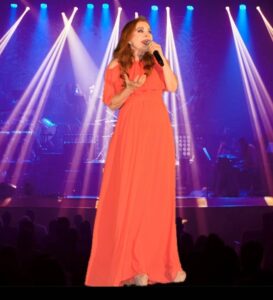Nadia Karagianni was born in Tropaia, Arcadia. Nadia is a staunch supporter and evident representative of the rich repertoire of rebetiko song.
She has collaborated with all famous big-name Greek singers and composers.
Nadia loves to sing and lives through singing.
When did you realise that music would be the path that you always wanted to follow in your life?
Singing came into my life magically. I discovered it when I was little. At the age of 11, I started taking accordion lessons at the Greek Conservatory in my hometown. So, I started singing and started thinking that I probably want to get into singing and become a singer. Along the way, I followed singing even though the family environment was music-loving. My father was a lawyer but he played the mandolin so there was all this music in the atmosphere at home. At school, I was participating in events that had to do with music but I was shy about going out in front of an audience to sing. But when I started doing it professionally little by little this shyness went away. So, I consciously entered the music industry and I started to sing. I loved it and I still love it to this day.
Did your brother Babis Tsertos play an important role in your career and how supportive he was in difficult times?
I started singing before Babis. Babis went to university. He studied physics. He never thought of himself as a singer. Initially, his presence didn't play a role. Along the way, when we worked together at 9/8 music venue at Alexandras Street, I was in a transitional phase, where I was at very large venues with big names as well as excellent singers, and there was Babis we decided to participate in some smaller venues where the music and the song work completely differently. Beyond that, Babis Tsertos was a great support for me. You know when a woman is alone in a workplace like ours, but also in general in all areas, it is important to have support from a family member and in my case, it was my brother. Having Babis by my side, I had the time to study music. Later, I had my own band where we performed in some places and did concerts where Babis participated in these concerts from time to time. My brother Babis played an important role and is still being protective. I thank him for it.
I could say that you are a music-loving family since your son followed the path of music and your granddaughter the path of acting. What inspired the children to follow an artistic path?
We have become a kind of artistic family but our parents were the ones who were music lovers and put their mark on us, permeating the passion for music. My son Nikos Karagiannis, who is a musician and composer, and Babis’ son Giannis Tsertos, who is an accordionist and pianist, studied musicology, are the young generation of singers. But also Konstantina Karagianni, my granddaughter who’s just 20 years old, graduated from Drama School. I think she is very talented and has an aptitude for various arts as she also paints in her own way. She is also involved in dancing.

Have you made but also lost money from your job?
Money is clearly what we have made from our work. I believe that anyone who deserves to be paid should be paid, but of course, this doesn’t apply to more cases nowadays. I don't think we've lost any money because we don't do our own production. We just show up and perform in places when cultural institutions or governmental entities invite us. As I said we don’t finance our own appearances.
What is your favourite genre of music?
I've thought about this myself many times. But I don't have anything specific. One day, I may listen to folk songs with good performers of the 30s. At that time, there were amazing folk singers. Some other times, I may listen to some songs so-called Greek art songs. I can listen to Asia Minor or rebetika songs or even listen to ballads. Greek music has a huge array of tunes as well as many different genres and is not one-dimensional music. I try to listen to and study the music and approach them with some fidelity and perform them by using the original score. I prefer and choose the best songs. What makes a click on me is the traditional song because maybe it's my origins from the Tropaia, Arcadia.
Many people or even performers divide music into two categories - the commercial and artistic models. Let us know what you think.
The term artistic, which is somehow inappropriate, means that some studied music such as Mikis Theodorakis, Stavros Xarchakos, Dionyssis Savvopoulos, set a different tone to music and because they had studied music, they knew how to write notes, which is why they called it an artistic Greek song. Commercial or mainstream songs have been presented without originality in the last two decades. Their aim is profit and has no quality presence thanks to the image of the singers. Of course, anyone of these singers is also measured in sales. The internet plays a primary role in the sales of those songs since it has passed in front of the record companies. In the past, it was the record companies that chose singers, musicians and creators. Things had begun to change around the 80s. After the 90s things changed completely. In the past, songs were written by giving them the right quality time, that’s why these songs are all-time classics and even today we hear these songs. In the last few years, we name commercial/mainstream songs that we see to be performed on the dance floor which last for 4 to 5 months and then we go on to the next ones. In the past, songs were both quality and commercial.

Which collaborations with other artists do you remember and which ones do you consider successful?
I was very lucky that from the very beginning, I found myself with all these great important performers and creators. When I was little, I remember myself reading and listening to the songs on the radio and I wish I could be standing next to Giannis Parios, Tolis Voskopoulos, Marinella or George Dalaras and Mikis Theodorakis. I was lucky enough to perform by the side of all of these singers. I also caught up with Poly Panou, Katie Gray, and Yiota Lydia. I also caught up with Grigoris Bithikotsis, who took me to some concerts with him. I had also met with Giorgos Mitsakis and talked about working on a project. But we didn't have time because he passed away. I met Manos Hadjidakis. I collaborated with Stavros Xarchakos, Christos Nikolopoulos and Antonis Vardis, Takis Soukas, Thanasis Polykandriotis, Lyno Kokotos, Lefteris Papadopoulos and Nikos Papazoglou, Manolis Rasoulis and Aristides Moschos whom I call the instructor of traditional music where I went to his school in1988. There are too many artists and I don't want to forget anyone. During my apprenticeship with them, I absorbed all information they taught me.
Is there discography and does the promotion of the artist's work done with the required procedures in Greece?
Artists have their discography which exists in another way in Greece. There are no albums, the CDs that were released had 12 to 15 tracks but now are single. And most of the songs are online and are aired first on the internet. The record companies I think have started doing the manager's work. They have some artists and they manage them. First of all, there is no copyright yet. I can tell you this because I have been in the Greek Singers' Union for years and we are struggling to see what happens with the copyrights of both singers and creators. As soon as a song is released, anyone can upload it to the internet without the approval of the creators, so the profits are reduced. There are of course some different music agencies that collect money for the rights. Today we see that every 2 to 3 months another song is released and it is promoted on the internet so the record companies have changed their structure. There are all these digital platforms that you can pay to listen to the song anytime you want.
Do you consider the new generation of artists lucky to have idols?
I find that all these old singers who had the size and quality in their work do not exist in recent years. Things have changed enormously. There is no Giannis Parios, this erotic singer with a big voice. There isn’t any of this size of artists on stage. The youngest performers have the standards that exist now and those that are projected through the internet. There are neither these singers nor these creators. The song and music will exist we will continue to sing and write music but it will not be the same. But there is not this plethora of many good songs and performers that existed in previous years. There are, of course, isolated cases today, but in the future, I do not know if there will be a plethora of artists that existed in the past. Of course, I haven’t met those great performers but in order to be able to become better at what I do, I look back at their discography and the history of music, I read, and I study so that I can have a complete view and know where I can perform. The new generation has to do that too, and they can't just follow what they see on TV and that's what they do. This has no artistic benefit.
What are your future plans?
My future plans are to be able to sing and compose some new songs. During this time, they will be released, a song every two to three months. At the same time, I want to continue my project on singers long before me and organise some special music events about these personalities such as Marika Ninou and Sotiriou Bellou.
Next season, I think of starting to create some performances about Asia Minor and rebetika but also to make concert tributes. Also, my son Nikos Karagiannis has written very nice songs for me and now I am preparing two or three more. I started three years ago and presented some of my own songs because I have been writing music for years, I haven't released them but I started making my own experiential song about Sotiria’s Bellou life. I had intended to make some tributes to her but due to the pandemic, this project was left behind I will do it later. Now, I have written a song about abandoned animals that was requested by an Animal Protection Association. I also wrote another song that was asked by the World Federation for the Return of Parthenon Marbles. Panos Kaloudas, a journalist, wrote the lyrics and I composed the music. I believe the new songs will be released in the next year.
Also, there are some other projects where I do with colleague singers in the studio where they trust me to perform their songs. Together with my brother Babis Tsertos, we continue for the third season at “Music Routes” (Mousikes Diadromes) music hall every Friday and Saturday and after the holidays we will also add Sunday noon. Another addition is singer Denia Kourousi and Dimitris Reppas who sings and plays the bouzouki amazingly.
Before we sign off this interview, is there anything else you would like to say?
We must have solidarity where everyone can always help each other and we need it more in recent years. To love more and have companionship. Also, we should eliminate any obsolete outlook.


